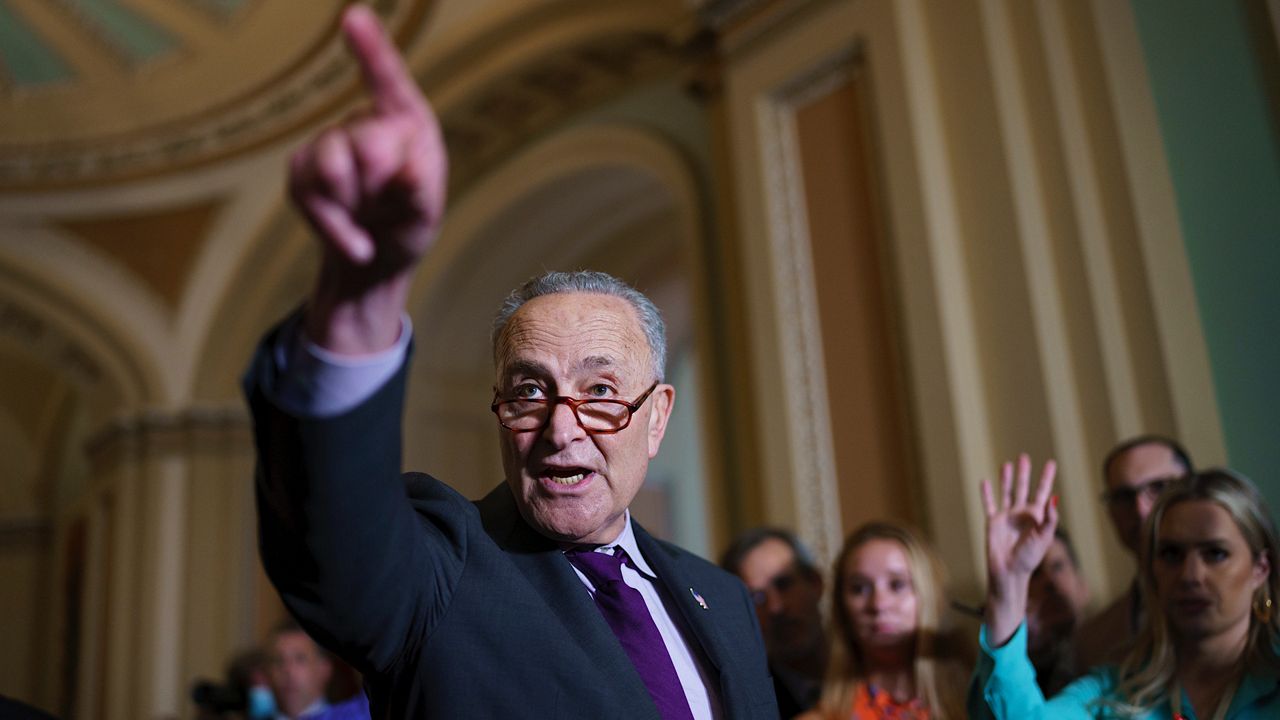Senate Majority Leader Chuck Schumer, D-N.Y., on Thursday announced that the body will vote on a voting rights measure backed by key moderate lawmaker Sen. Joe Manchin, D-W.Va., the latest chapter in the battle over access to the ballot box.
The bill, known as the Freedom to Vote Act, was unveiled by Minnesota Sen. Amy Klobuchar last month and contains many of the provisions of the sweeping For the People Act, which passed the House but was blocked by Senate Republicans.
The measure would make Election Day a federal holiday, ensure that states offer same-day voting registration, guarantee at least 15 days of early voting, including two weekends, ban partisan gerrymandering of Congressional districts, create automatic voter registration programs, bolster election security and mandate donor disclosure.
The bill also contains voter identification measures — a provision opposed by many Democrats, though supported by Manchin — but would allow for a wide range of options in terms of what documents voters can present, in either physical or digital form.
Unlike the For the People Act, however, this bill carries the backing of the full Democratic caucus, including Manchin, who has been working to get Republican support for the bill.
“Senator Manchin has been engaged in conversations with our Republicans colleagues in hopes of advancing solutions on a bipartisan basis to ensure all Americans have their voice heard in our democracy,” Majority Leader Schumer wrote in his letter to colleagues on Thursday.
The move is the latest attempt by Democrats to beat back restrictive voting measures implemented by Republican-led state legislatures across the country. Between January and July of 2021, at least 18 states implemented 30 laws that restrict voting access, according to an analysis from the Brennan Center for Justice, including states like Florida, Texas and Georgia.
In that same period, the Brennan Center notes, 25 states enacted 54 laws that expanded access to the ballot box.
It is unclear whether Manchin’s efforts have swayed enough Republicans to overcome the Senate’s 60-vote legislative filibuster threshold, which doomed the For the People Act earlier this year.
"I hope that our Republican colleagues will join us in good faith, and as I have said before, if they have ideas on how to improve the legislation, we are prepared to hear them, debate them, and if they are in line with the goals of the legislation, include them in the bill," Schumer wrote in his letter. "But Republicans must come to the table to have that conversation and at the very least vote to open debate.”
“We cannot allow conservative-controlled states to double down on their regressive and subversive voting bills,” Schumer continued. “The Freedom to Vote Act is the legislation that will right the ship of our democracy and establish common sense national standards to give fair access to our democracy to all Americans.”
The New York Democrat thanked Manchin for his efforts in garnering bipartisan support and echoed his earlier call for Republicans to come to the negotiating table: “I hope Republicans now join us in common-cause to protect the integrity of our democracy.”
Schumer, in his letter, also wrote that he plans to move forward with the Build Back Better Act — the sweeping social safety net expansion that makes up one of the two core tenets of President Joe Biden’s economic agenda — by the end of the month.
The bill would fund measures to fight climate change, provide universal pre-Kindergarten and free community college and establish a paid family leave program, and would largely be funded by taxes on the wealthiest Americans and corporations. Democrats in both chambers are split on the price tag of the bill, with Manchin and other moderates hoping for a price tag lower than the $3.5 trillion initially proposed by progressives. In recent weeks, President Biden has been pitching a compromise in the range of $1.9-$2 trillion
"To pass meaningful legislation, we must put aside our differences and find the common ground within our party," Schumer said of the spending bill. "As with any bill of such historic proportions, not every member will get everything he or she wants.”
“At the end of the day, we will pass legislation that will dramatically improve the lives of the American people,” Schumer wrote. “And we must aim to do that in the month of October.”



